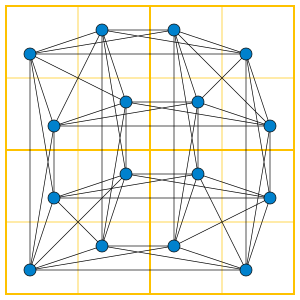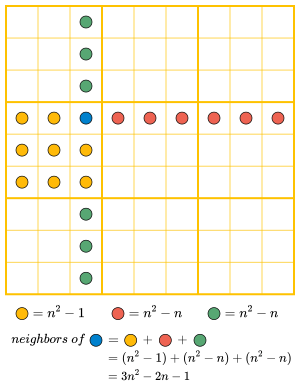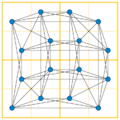Sudoku graph facts for kids
The Sudoku graph is a special way to look at a Sudoku puzzle using graphs. In math, a graph is a collection of points (called vertices) connected by lines (called edges). For a Sudoku graph, each square (or cell) on the Sudoku board is a vertex. An edge connects two cells if they are in the same row, column, or 3x3 block. This means those two cells cannot have the same number in a solved Sudoku puzzle. Thinking about Sudoku this way helps mathematicians understand how these puzzles work and how to solve them.
How Many Cells and Connections?
A standard Sudoku puzzle is a 9x9 grid. This means it has 81 cells in total. In the Sudoku graph for a 9x9 puzzle, there are 81 vertices. Each of these 81 cells is connected to 20 other cells. For example, a cell in the middle of the grid is connected to 8 other cells in its row, 8 other cells in its column, and 4 other cells in its 3x3 block (excluding itself and the cells already counted in the row/column). This adds up to 20 connections!
Because every cell has the same number of connections (20), we call it a regular graph. In total, a 9x9 Sudoku graph has 810 connections (edges).
For a smaller 4x4 Sudoku board, like the one in the picture, there are 16 cells (vertices). Each cell is connected to 7 other cells. So, it's a 7-regular graph. This smaller graph has 56 connections in total.
Solving Sudoku with Graph Coloring
Imagine you want to solve a Sudoku puzzle. You need to fill numbers into empty cells. In graph theory, this is like a graph coloring problem. Each number you place in a cell is like giving that cell a "color."
The rule is that cells connected by an edge (meaning they are in the same row, column, or block) cannot have the same number. This is exactly what graph coloring does: connected vertices must have different colors.
When you start a Sudoku puzzle, some cells already have numbers. This is like having some vertices already "pre-colored." Your job is to "color" the rest of the vertices using the available numbers (colors) without breaking the rules. This is known as the precoloring extension problem. So, solving a Sudoku puzzle is basically a fun way to do a graph coloring puzzle!
Images for kids
 | Sharif Bey |
 | Hale Woodruff |
 | Richmond Barthé |
 | Purvis Young |





